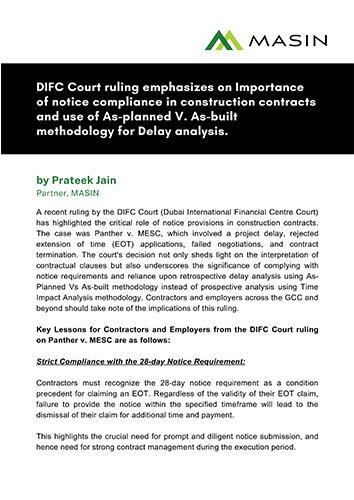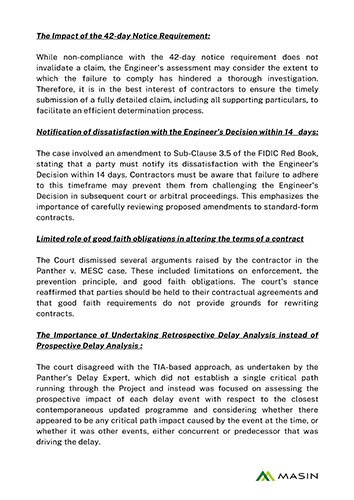

The Court also recognized that in undertaking the As-Planned vs As-built analysis, the MESC’s Delay Expert:
The court declared that the analysis presented by the Panther’s Delay Experts was significantly less reliable than that of MESC’s Delay Expert because they did not conduct any independent analysis to verify what was the correct critical path but instead considered the pleaded delay events in the light of the contemporaneous updated programmes.
- Took the planned dates (start and finish) of activities from the Approved Baseline Programme.
- Took the actual dates/ progress data from the contemporaneous updated programmes, but only after validation from the data recorded in the project’s primary records such as Weekly/ Monthly progress records.
- Identified the Delay Events advanced by MESC, established their relation/ effect on the critical path (if any), and assessed the impact of each delay event on the critical path.
Frequently Asked Questions
Get answers to frequently asked questions about everything we do.
What is the main focus of this eBook?
This eBook analyzes a significant DIFC Court judgment in the Panther v. MESC case, highlighting the critical importance of notice compliance under FIDIC contracts and the appropriate use of delay analysis methods—especially retrospective (As-Planned vs As-Built) over prospective (Time Impact Analysis).
Why is the case of Panther v. MESC important?
The case sets a legal precedent emphasizing that failure to comply with contractual notice provisions—such as 28-day or 14-day requirements—can invalidate legitimate Extension of Time (EOT) claims. It reinforces that courts will uphold strict contract terms over general arguments of good faith.
What delay analysis methodology did the court support and why?
The court endorsed As-Planned vs As-Built (APAB) analysis as performed by MESC’s Delay Expert (Rohit Singhal, MASIN), citing its adherence to SCL Protocol standards. The court rejected Time Impact Analysis (TIA) due to its ineffectiveness in post-completion assessments and its lack of clarity in identifying a definitive critical path.
Who is this eBook intended for?
The content is particularly relevant for:
- Contractors and construction project managers
- Delay analysts and claims consultants
- Legal professionals handling construction disputes
- Employers and stakeholders using FIDIC-based contracts
What are the key takeaways from this eBook?
- Strict compliance with notice requirements is legally binding.
- Retrospective delay analysis is preferred in post-completion scenarios.
- Contractors must document delays with precision and align with project records.
- Good faith arguments will not override explicit contract clauses.
- Early and accurate delay assessments are crucial to claim credibility
